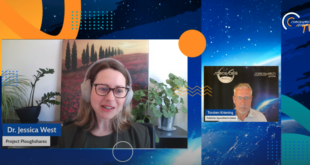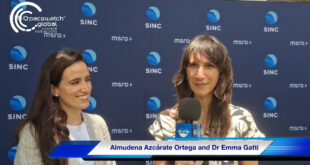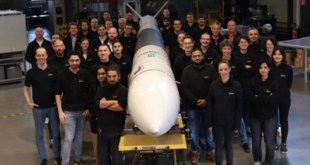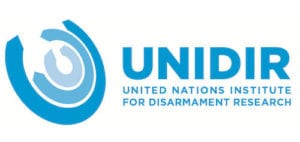 As the debate about arms in space rages on and becomes more of a concern for countries all over the world, the importance of discussion within the international community becomes even more critical. In this interview, Renata Dwan, Director of the United Nations Institute for Disarmament Research (UNIDIR), gives us her insight into the prevention of arms in space and the important activities that her organisation undertakes.
As the debate about arms in space rages on and becomes more of a concern for countries all over the world, the importance of discussion within the international community becomes even more critical. In this interview, Renata Dwan, Director of the United Nations Institute for Disarmament Research (UNIDIR), gives us her insight into the prevention of arms in space and the important activities that her organisation undertakes.
Renata, it’s a pleasure to speak with you. Can you please give us a quick overview about the general work of UNIDIR in relation to space?
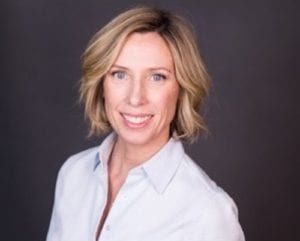 The United Nations Institute for Disarmament Research has been in existence for almost four decades. We’re a distinct organisation: an autonomous research institute within the UN for the purposes of supporting Member States in deliberating and negotiating arrangements to advance international security, arms control and disarmament. In doing so, we work with the research and technical expert communities, as well as engaging private sector and civil society to bring diverse ideas and perspectives to intergovernmental processes. We very much see our role as facilitating exchange and bridging across these different communities.
The United Nations Institute for Disarmament Research has been in existence for almost four decades. We’re a distinct organisation: an autonomous research institute within the UN for the purposes of supporting Member States in deliberating and negotiating arrangements to advance international security, arms control and disarmament. In doing so, we work with the research and technical expert communities, as well as engaging private sector and civil society to bring diverse ideas and perspectives to intergovernmental processes. We very much see our role as facilitating exchange and bridging across these different communities.
Space is one of the areas that UNIDIR has worked in for many years. We have a dedicated space security fellow and dedicated research, publications and activities space issues. Member states have grappled for many years on how space security might be advanced and, specifically, how to prevent an arms race in outer space. We see our role as trying to support those discussions and processes with a view to reaching progress on the governance of space.
How many people do you have in your team?
We number around 35 resident in Geneva. We also engage external consultants with specific areas of expertise and many of our non-resident consultants are based in different parts of the world.
Our annual space security conference reflects our core functions. It encourages discussions between Member States on the issues around stability and security in space and informs those discussions with the presence and engagement of experts. The private sector is playing an increasing role in that. Diverse participation helps build awareness of new political, technical, economic as well as security developments and contributes to a multi stakeholder dialogue. The timing of this year’s conference is particularly relevant to the current discussions that have been taking place over the course of the past year in the UN on the prevention of an arms race in outer space. It’s a moment to ask: “where do we go next?”
What were your expectations of this year’s conference and have these expectations exceeded – or has it just been another conference?
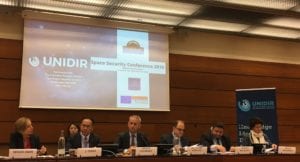 This year it felt like a special conference for a couple of reasons. One, when we’ve had these conferences before, they haven’t taken place against a backdrop of member states coming together for weeks at a time and trying to negotiate issues, frameworks and achieving some consensus. In the course of those discussions, key issues, fault lines and questions emerged. Our conference has zoomed in and sought to frame these issues. As a result, we have had much more focused discussions. We have been able to look at the points of Member State convergence, of divergence and of identified gaps in space security governance.
This year it felt like a special conference for a couple of reasons. One, when we’ve had these conferences before, they haven’t taken place against a backdrop of member states coming together for weeks at a time and trying to negotiate issues, frameworks and achieving some consensus. In the course of those discussions, key issues, fault lines and questions emerged. Our conference has zoomed in and sought to frame these issues. As a result, we have had much more focused discussions. We have been able to look at the points of Member State convergence, of divergence and of identified gaps in space security governance.
The second distinctive element of this year’s conference is that it is taking place against a backdrop of greater public attention on space issues. The decision by the United States to establish a Space Force, China’s landing spacecraft on the far side of the moon, India’s testing of an anti-satellite missile and continued high profile commercial investments have brought space more to the fore It has captured the public imagination and the attention of the private sector.
I think it’s great that the content of the conference will be made publicly available on your website so there are no Chatham House Rules. It’s just open for the public. That’s also something very new that you have introduced.
It is new. One of the factors that has enabled us to be an impartial forum where different actors can come together has been our commitment to off the record discussions. We haven’t taken the decision to make these discussions public lightly, but we have decided that if we are going to try to make an impact that goes beyond just those that are in the room, we’re going to have to explore ways to communicate with a broader community and allow debates to expand.
I think one of the things we hear again and again in conferences is the term ‘transparency’ or ‘openness’ and this really pays off. You talked about the processes of PAROS and GGE, can you give us an update on that, and how we can potentially move forward with that?
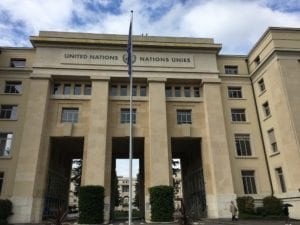 The group of government experts (GGE) is a mechanism that the UN General Assembly employs where Member States trigger when they want to explore technical issues with a view, potentially, to identifying potential priorities and areas of consensus for future arms control or disarmament arrangements. Experts from selected Member States come together to tease out the issues and to present their findings to the General Assembly so that policymakers can draw on them in their policy development. It’s not simply a group of academics or experts debating highly technical issues: such groups usually provide quite an accurate reflection of political divides or areas of consensus.
The group of government experts (GGE) is a mechanism that the UN General Assembly employs where Member States trigger when they want to explore technical issues with a view, potentially, to identifying potential priorities and areas of consensus for future arms control or disarmament arrangements. Experts from selected Member States come together to tease out the issues and to present their findings to the General Assembly so that policymakers can draw on them in their policy development. It’s not simply a group of academics or experts debating highly technical issues: such groups usually provide quite an accurate reflection of political divides or areas of consensus.
This year, on PAROS, (the prevention of arms race in outer space), it was proposed that a group of government experts address the possibility of a treaty preventing the placement of weapons in space. This, as you know, was a Russian-Chinese proposal. It’s not a new proposal. But the idea to put it back on the table reflects, I think, an appreciation that political and security developments, technological as well as commercial drivers are affecting and impacting the global commons of space.
I think what was striking about this GGE was the extent to which government experts actively participated. There was meaningful and serious discussion about the barriers to regulating arms control in space. And these were serious actors such as Russia, China, the United States, UK, India, France, Germany and other spacefaring nations such as Australia.
There were two weeks of discussions in two phases. There was also engagement with the private sector. In the end, there wasn’t agreement and one country broke consensus with the draft report. While this can be seen as a failure I think the work undertaken by the GGE provides us with possibly the best foundation we have had in a number of years to advance dialogue on space security issues.
First, the process highlighted some critical questions: Should we be regulating physical objects in space? Or should we be regulating behaviour in space? How can we address dual use capabilities and activities, such as on-orbit operations? Can we ever verify a weapon in space? Can we ever verify an attack on space? Can space security processes draw on the lessons of verification in other areas, such as, for example, nuclear weapons? These are all critical issues that were discussed in some detail.
We can see emerging consensus that we have to think about behaviour. And that need to grapple with dual use. So perhaps there may be growing attention on processes that regulate behaviour: voluntary transparency measures, confidence building measures, possible areas of cooperation around safety or specific issues such as space debris management. We’re still going to see a fault line on whether to pursue regulation regarding the placement of some capacities in space. That’s to do with perceptions of missile defense and the evolving missile defense systems.
Going forward, we could see discussion of a combination of arrangements on certain specific norms and principles for behaviour in space – and potentially voluntary arrangements among a range of states, commitments to a set of specific guidelines. Perhaps this might provide a step to more comprehensive legally binding arrangements regarding certain types of offensive actions, for example, prohibiting the deliberate destruction of a State’s space assets. UNIDIR will be exploring the range of options and instruments to address specific issues, behaviours and threats. We don’t think there’s going to be a single, overarching framework or treaty that can be universally agreed. But perhaps one can explore multiple instruments to address specific actions and encourage and support restraint in offensive and destructive actions.
One of the reasons why it’s proving so difficult to negotiate agreements on space security is the extent to which technology developments are still in an expansive phase. States are concerned about tying themselves down and restricting themselves, not knowing where we are in the arc of technological development of specific developments.
These specific technologies are available in a handful of countries. So are those countries all on the table? Are they talking about it?
Well, one of the things that’s useful about a GGE is that it’s interesting to see which countries engage. GGE usually have around 25 government experts participating in them. States submit their nominations for selection by the Secretary General. All main space-faring countries have sought to be part of these discussions. I would say that there is scepticism from quite a few states as to whether any type of governance in space is sufficient. What I think is lacking in this space security debate and is more prevalent in discussions on the peaceful uses of space is recognition of interdependency of states and all actors for security and stability in space.
What could potentially be the way forward? And what sort of timeline are we looking at? Is there a timeline already set or?
Well, traditionally, arms control processes take a long time and involve inter alia, trust and confidence building dialogue, establishing the scope of issues under discussion, detailing of technical specifications, and consideration of different scenarios, with a view to establishing verification, monitoring, and compliance arrangements. And that is another reason why there may be value in exploring a range of approaches and instruments. It is interesting to note however how separate intergovernmental space security discussions have been from discussions on cyber stability. But this is an increasingly difficult distinction to make and, as intergovernmental discussions on norms and principles of responsible state behaviour in cyberspace get underway in later this year, we may see dialogue on management of cyber security threats having a knock-on effect on discussions around space security.
The conference circuit is a busy one! What is unique about your conference, and what do you expect for next year?
I think you’re right. It’s becoming a crowded field, just like space itself. And I think that what’s unique about the UNIDIR Space Security Conference is that it takes place in the UN with the people who are involved with making the policies. It allows a degree of informality and the opportunity for experts to interact and engage with policymakers and give their perspective. I think that’s different than other discussions.
The other aspect that makes us a little different this year is the fact that we’re trying to bring together the Vienna community, the Geneva and the New York multilateral community to overcome what are often very siloed conversations. We are trying to be proactive in that way too.
Next year, I think we will see how we can support some of the processes of the Members States, but I also think we need to broaden the debate to a wider number of Member States. We do have quite a bit of diversity. But I think what would be really fascinating is to try to build a broader participation and engagement among all 194 Members. Space is everyone’s concern.
How do you connect with people and resonate with them? How can media support especially the work of UNIDIR?
I don’t think UNIDIR is a public communicator as much as supporting communication between and among different communities. W we try to help communicate academic research and work and ideas to the policymaking community, through our publications, and reflect, vice versa, policy processes to technical experts. That said, I do think there is significant potential to expand debate to a wider audience beyond space experts or policy makers. We talk about the size of the space economy, the link between the Sustainable Development Goals and space and it can be surprising for non-space experts to learn about how much their wellbeing and development relies on space activities.
Another element encouraging expansion of space discussions is how to ensure that the opportunities provided by space are open and accessible to all states. I think that space is one of those few areas where it’s really possible to talk about a global commons. It is important that we talk about equality and equitable access to space and development. It’s important that the media doesn’t become fixated with two to three major space actors. We are all focused on relations between major space actors such as Russia, China, and the US and that’s vitally important because of the implications for strategic stability on earth as well as in space. However, it’s really important to go beyond that to talk about the range of actors involved. I don’t see as much coverage of that in the media.
Security on Earth requires clear thinking. My message would be that if you’re concerned about conflict and risk in earth, then you need to be thinking about addressing competition in space.
 Bio: Renata joined the United Nations Institute for Disarmament Research (UNIDIR) after 13 years working on peace and security issues at the United Nations, most recently as Chief of Policy and Best Practices in the Departments of Peacekeeping Operations and Field Support. In 2015-16 she led the team to implement Secretary-General Ban Ki-Moon’s reform initiative on peace operations, the High-level Panel on Peace Operations, and was a member of Secretary-General Guterres’ team reviewing the UN’s peace and security architecture in 2017. Renata has worked on peace operations and complex emergencies at UN Headquarters and in Afghanistan, the Democratic Republic of Congo, Haiti, Mali and Syria. She led major UN-wide policy and reform initiatives on peace and security issues including security sector reform, peacekeeping partnerships and crisis management capacities.
Bio: Renata joined the United Nations Institute for Disarmament Research (UNIDIR) after 13 years working on peace and security issues at the United Nations, most recently as Chief of Policy and Best Practices in the Departments of Peacekeeping Operations and Field Support. In 2015-16 she led the team to implement Secretary-General Ban Ki-Moon’s reform initiative on peace operations, the High-level Panel on Peace Operations, and was a member of Secretary-General Guterres’ team reviewing the UN’s peace and security architecture in 2017. Renata has worked on peace operations and complex emergencies at UN Headquarters and in Afghanistan, the Democratic Republic of Congo, Haiti, Mali and Syria. She led major UN-wide policy and reform initiatives on peace and security issues including security sector reform, peacekeeping partnerships and crisis management capacities.
Before joining the United Nations, Renata was head of Stockholm International Peace Research Institute’s Programme on Armed Conflict and Conflict Management (1999-2005) and Deputy Director of the EastWest Institute’s European Security Programme in Budapest (1997-1999). She was Special Adviser to the European Union Council Secretariat for the first European Union crisis management operation and a member of EU High Representative Javier Solana’s 2004 Task Force on a Human Security Doctrine for Europe.
Renata holds a M.Phil and D.Phil from the University of Oxford where she was the Hedley Bull Junior Research Fellow in International Relations. She was a Fulbright Scholar at Princeton University and a visiting researcher at the former Western European Union Institute for Security Studies in Paris. She has published widely on international security matters.
#SpaceWatchGL thanks Renata Dwan for the interview


